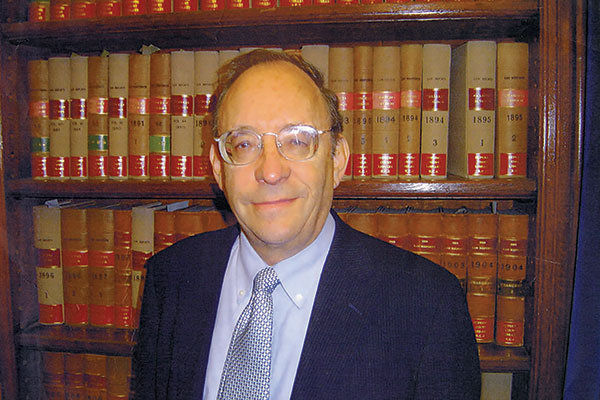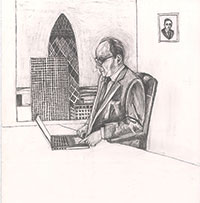*/

Sir Gavin Lightman passed away on 2 March 2020, six months after being diagnosed with an inoperable brain tumour. He was called to the Bar in 1963, took silk in 1980 and was appointed as a High Court judge in 1994. After his retirement from the Bench in 2008, he was Treasurer of Lincoln’s Inn for the year 2008-2009. It is a reflection of his deeply held belief in the importance of justice that the motto (in Hebrew) which he chose for his coat of arms which is on the wall of Lincoln’s Inn’s Great Hall was Im Ain Mishpat Ain Shalom, which may be translated as ‘Without law, there can be no peace’.
Gavin Lightman was born in London in 1939, at a time when the poison of anti-Semitic hatred was all too prevalent. His father, Harold Lightman QC, was one of the first Jews to head chambers, at 13 Old Square, Lincoln’s Inn. Gavin was sent to boarding school aged just 2½, and experienced bullying. No doubt his passion for justice was heavily informed by these experiences. He attended Dulwich College and then read law at UCL, where his was the only First awarded in 1961.
Gavin won a Fulbright Scholarship to do an LLM at the University of Michigan and thereafter taught land law for a year at the University of Sheffield. He also taught land law at Merton College, Oxford, and, together with Gabriel Moss QC, he co-authored the seminal text Lightman & Moss on the Law of Administrators and Receivers of Companies (now in its sixth edition). His clients at the Bar were often high-profile and the range of his work was wide and varied. He represented the National Union of Miners during the Miners’ Strike in 1984-1985, and became friendly with Arthur Scargill. Nevertheless, he did not shirk from criticising Scargill in his report, for which he was chosen by the Haldane Society, in 1990 concerning mishandling of cash donations during the Miners’ Strike. In 1989, he saved Private Eye from almost certain closure by successfully arguing for a reduction of the £600,000 damages award to £60,000 in favour of Sonia Sutcliffe, the wife of the so-called Yorkshire Ripper. He also undertook cases in the courts of Barbados, Bermuda, Singapore and Hong Kong.
I appeared against Gavin at the beginning of my practice when he acted for the government against financial advisers in the Barlow Clowes civil litigation. Thereafter I appeared in front of him as Treasury Counsel in the Administrative Court, as well as otherwise in Chancery cases. After his retirement he was part of the arbitral tribunal on a shipping matter in which I appeared as counsel.
One of his former opponents, Lord Neuberger, later the President of the UK Supreme Court, described Gavin as ‘fearless, clear and speedy. If he was my opponent, I would always do that extra bit of preparation the night before the case was due to start’. Lord Briggs of Westbourne said of Gavin ‘quite simply, the best chancery lawyer I have ever known. Both as a judge and as a barrister he had an assured sense of the right legal principle to apply to any fact situation that presented itself… Throughout our time in chambers together I regarded him as my mentor and friend. He gave freely of his time, wisdom and loving kindness.’
It was (and is rare) for sitting judges to go to print on their candid views of the legal system and access to justice. He was unafraid to do so, even if that may well explain in part why he did not advance (as his ability merited) beyond the High Court Bench.
In 1999, writing in the New Law Journal, he observed that: ‘The aim of the judge is by judicial intervention to promote justice by saving time and costs and concentrating on essential issues without any sacrifice of the principles of impartiality.’ In his article for the New Law Journal in 2004 ‘Litigation: the last resort’, he wrote: ‘In litigation there is only one winner – and that is generally the lawyer.’ He was characteristically unafraid to speak his mind in 2007 when he wrote in the Times: ‘The Government has been willing to spend millions on luxuries such as wallpaper, the Dome and the Olympic Games – but unwilling to fund access to justice. The dilemma, then, is how to provide the protection of the law to citizens who cannot pay.’
At a time when having the courage of one’s convictions, honesty and integrity are increasingly rare in public life, Sir Gavin Lightman’s life exemplifies those qualities.


Sir Gavin Lightman passed away on 2 March 2020, six months after being diagnosed with an inoperable brain tumour. He was called to the Bar in 1963, took silk in 1980 and was appointed as a High Court judge in 1994. After his retirement from the Bench in 2008, he was Treasurer of Lincoln’s Inn for the year 2008-2009. It is a reflection of his deeply held belief in the importance of justice that the motto (in Hebrew) which he chose for his coat of arms which is on the wall of Lincoln’s Inn’s Great Hall was Im Ain Mishpat Ain Shalom, which may be translated as ‘Without law, there can be no peace’.
Gavin Lightman was born in London in 1939, at a time when the poison of anti-Semitic hatred was all too prevalent. His father, Harold Lightman QC, was one of the first Jews to head chambers, at 13 Old Square, Lincoln’s Inn. Gavin was sent to boarding school aged just 2½, and experienced bullying. No doubt his passion for justice was heavily informed by these experiences. He attended Dulwich College and then read law at UCL, where his was the only First awarded in 1961.
Gavin won a Fulbright Scholarship to do an LLM at the University of Michigan and thereafter taught land law for a year at the University of Sheffield. He also taught land law at Merton College, Oxford, and, together with Gabriel Moss QC, he co-authored the seminal text Lightman & Moss on the Law of Administrators and Receivers of Companies (now in its sixth edition). His clients at the Bar were often high-profile and the range of his work was wide and varied. He represented the National Union of Miners during the Miners’ Strike in 1984-1985, and became friendly with Arthur Scargill. Nevertheless, he did not shirk from criticising Scargill in his report, for which he was chosen by the Haldane Society, in 1990 concerning mishandling of cash donations during the Miners’ Strike. In 1989, he saved Private Eye from almost certain closure by successfully arguing for a reduction of the £600,000 damages award to £60,000 in favour of Sonia Sutcliffe, the wife of the so-called Yorkshire Ripper. He also undertook cases in the courts of Barbados, Bermuda, Singapore and Hong Kong.
I appeared against Gavin at the beginning of my practice when he acted for the government against financial advisers in the Barlow Clowes civil litigation. Thereafter I appeared in front of him as Treasury Counsel in the Administrative Court, as well as otherwise in Chancery cases. After his retirement he was part of the arbitral tribunal on a shipping matter in which I appeared as counsel.
One of his former opponents, Lord Neuberger, later the President of the UK Supreme Court, described Gavin as ‘fearless, clear and speedy. If he was my opponent, I would always do that extra bit of preparation the night before the case was due to start’. Lord Briggs of Westbourne said of Gavin ‘quite simply, the best chancery lawyer I have ever known. Both as a judge and as a barrister he had an assured sense of the right legal principle to apply to any fact situation that presented itself… Throughout our time in chambers together I regarded him as my mentor and friend. He gave freely of his time, wisdom and loving kindness.’
It was (and is rare) for sitting judges to go to print on their candid views of the legal system and access to justice. He was unafraid to do so, even if that may well explain in part why he did not advance (as his ability merited) beyond the High Court Bench.
In 1999, writing in the New Law Journal, he observed that: ‘The aim of the judge is by judicial intervention to promote justice by saving time and costs and concentrating on essential issues without any sacrifice of the principles of impartiality.’ In his article for the New Law Journal in 2004 ‘Litigation: the last resort’, he wrote: ‘In litigation there is only one winner – and that is generally the lawyer.’ He was characteristically unafraid to speak his mind in 2007 when he wrote in the Times: ‘The Government has been willing to spend millions on luxuries such as wallpaper, the Dome and the Olympic Games – but unwilling to fund access to justice. The dilemma, then, is how to provide the protection of the law to citizens who cannot pay.’
At a time when having the courage of one’s convictions, honesty and integrity are increasingly rare in public life, Sir Gavin Lightman’s life exemplifies those qualities.



The Bar Council is ready to support a turn to the efficiencies that will make a difference
By Louise Crush of Westgate Wealth Management
Marie Law, Director of Toxicology at AlphaBiolabs, examines the latest ONS data on drug misuse and its implications for toxicology testing in family law cases
An interview with Rob Wagg, CEO of New Park Court Chambers
What meaningful steps can you take in 2026 to advance your legal career? asks Thomas Cowan of St Pauls Chambers
Marie Law, Director of Toxicology at AlphaBiolabs, explains why drugs may appear in test results, despite the donor denying use of them
The appointments of 96 new King’s Counsel (also known as silk) are announced today
Ready for the new way to do tax returns? David Southern KC continues his series explaining the impact on barristers. In part 2, a worked example shows the specific practicalities of adapting to the new system
Resolution of the criminal justice crisis does not lie in reheating old ideas that have been roundly rejected before, say Ed Vickers KC, Faras Baloch and Katie Bacon
With pupillage application season under way, Laura Wright reflects on her route to ‘tech barrister’ and offers advice for those aiming at a career at the Bar
Jury-less trial proposals threaten fairness, legitimacy and democracy without ending the backlog, writes Professor Cheryl Thomas KC (Hon), the UK’s leading expert on juries, judges and courts